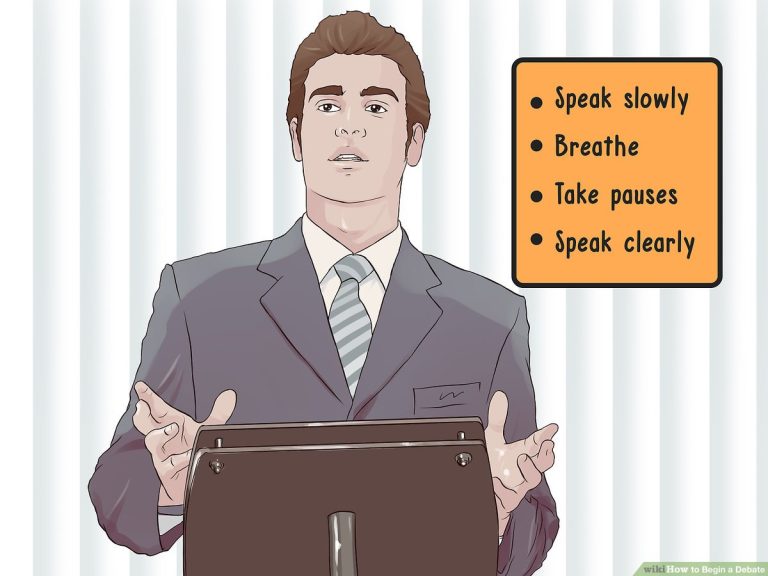How Do You Speak Confidently in a Debate? Master These Tips
Speaking confidently in a debate requires practice and preparation. Confidence can make your arguments more persuasive and impactful.
But how do you achieve that level of confidence? Debates can be intimidating. You face an audience, counter-arguments, and the pressure to perform well. Building confidence begins with understanding the topic deeply. Knowledge is power. When you know your subject, you can speak with authority.
Practice your speech and anticipate possible counter-arguments. This helps you stay composed during the debate. Also, focus on your body language. Stand tall, maintain eye contact, and use gestures to emphasize points. These non-verbal cues convey confidence. Remember, confidence grows with experience. Each debate is a learning opportunity. So, embrace the challenge and watch your confidence soar.

Credit: www.instagram.com
Preparation Techniques
Preparation is essential for speaking confidently in a debate. Being well-prepared helps you convey your thoughts clearly and respond effectively to opponents. Let’s explore some key preparation techniques that will boost your confidence and performance in debates.
Research Thoroughly
Start by researching your debate topic thoroughly. Gather information from reliable sources like books, academic journals, and reputable websites. Understand the arguments from both sides. This knowledge will help you anticipate counterarguments and strengthen your own points.
Take notes as you research. Highlight key facts, statistics, and quotes that support your arguments. Organizing your research materials will make it easier to reference them during the debate.
Organize Key Points
After gathering information, organize your key points. Create an outline that includes your main arguments and supporting evidence. This structure will guide you during the debate and keep you focused.
Divide your arguments into clear sections. Each section should cover a specific point and include relevant evidence. Practice delivering your points in a logical and concise manner. This will help you speak clearly and confidently during the debate.
Prepare rebuttals for potential counterarguments. Think about what your opponents might say and plan responses. This will show that you are prepared and can think on your feet.
Finally, practice your speech. Rehearse in front of a mirror or with friends. This will help you become more comfortable with your material and improve your delivery.

Credit: myperfectwords.com
Building Confidence
Building confidence is crucial for speaking effectively in a debate. Confidence helps you deliver your points clearly and persuasively. It allows you to engage with your audience and opponents. Here are some strategies to build that confidence.
Practice Regularly
Practicing regularly helps you become familiar with your material. Rehearse your arguments and responses. Practice with friends or family members. Record yourself and review your performance. Each practice session will make you more comfortable.
Join debate clubs or groups. Participate in mock debates. The more you practice, the more confident you will feel.
Use Positive Affirmations
Positive affirmations can boost your confidence. Tell yourself that you can do it. Remind yourself of your strengths. Positive thoughts can reduce anxiety and build self-belief.
Write down affirmations and read them before the debate. Repeat them to yourself. This mental preparation can make a big difference.
Effective Communication
Effective communication is the foundation of any debate. It involves not just the words spoken, but also how they are delivered. To speak confidently in a debate, you must focus on your body language and voice control.
Master Body Language
Your body language speaks volumes. Stand tall and maintain eye contact with your audience. This shows confidence. Use hand gestures to emphasize points. But do not overdo it. Your gestures should feel natural and not distract from your message.
| Body Language Tips | Explanation |
|---|---|
| Maintain Eye Contact | Shows confidence and keeps the audience engaged. |
| Stand Tall | Conveys self-assurance and authority. |
| Use Hand Gestures | Emphasizes key points without being distracting. |
Control Your Voice
Your voice is a powerful tool in a debate. Speak clearly and at a moderate pace. This ensures your message is understood. Vary your tone to keep the audience interested. Avoid a monotone voice. It can make your speech dull.
- Speak Clearly: Helps in delivering your message effectively.
- Moderate Pace: Ensures your words are understood.
- Vary Your Tone: Keeps the audience engaged and interested.
Effective communication in a debate is not just about what you say. It is also about how you say it. Master your body language and control your voice to speak confidently.
Handling Challenges
During a debate, facing challenges is inevitable. You may encounter tough questions or strong counterarguments. Knowing how to handle these challenges will help you speak confidently.
Stay Calm Under Pressure
Staying calm is crucial during a debate. When you remain composed, you think clearly and respond better. Here are some tips to help you stay calm:
- Take deep breaths.
- Maintain good posture.
- Pause before you speak.
Deep breaths help you control your nerves. A good posture shows confidence. Pausing before you speak gives you time to think.
Responding To Counterarguments
Responding to counterarguments effectively is a key skill in a debate. Here are some strategies to consider:
- Listen carefully to the counterargument.
- Summarize their point to show understanding.
- Use facts and evidence to refute their claim.
Listening carefully ensures you do not miss any important details. Summarizing shows you understand their point. Using facts and evidence helps you build a strong response.
Here is a simple table summarizing these strategies:
| Strategy | Description |
|---|---|
| Listen Carefully | Ensure you understand the counterargument completely. |
| Summarize Their Point | Show that you have understood their argument. |
| Use Facts and Evidence | Provide strong evidence to support your rebuttal. |
:max_bytes(150000):strip_icc()/GettyImages-7364923351-5a9471548e1b6e00371354c5.jpg)
Credit: www.verywellmind.com
Frequently Asked Questions
How Can I Stay Calm During A Debate?
Practice deep breathing. Focus on your points. Stay positive and composed. Remember, it’s just a discussion.
What Techniques Help In Speaking Confidently?
Use clear and concise language. Maintain eye contact. Practice your speech. Know your topic well.
How Do I Handle Unexpected Questions?
Stay calm. Take a moment to think. Answer honestly. If unsure, admit it and offer to find out more.
Conclusion
Speaking confidently in a debate takes practice and preparation. Use clear and concise language. Listen actively to understand your opponent’s points. Maintain steady eye contact and good posture. Take deep breaths to stay calm. Practice regularly to build confidence. Know your topic well to speak with authority.
Stay respectful and composed, even if challenged. Remember, confidence grows with experience. Keep learning and improving your skills. By following these tips, you can speak confidently in any debate.






